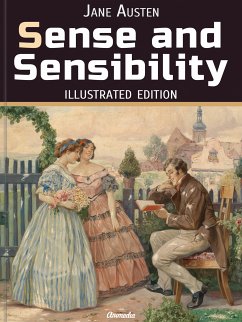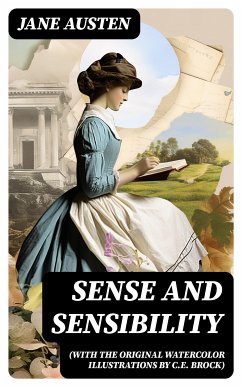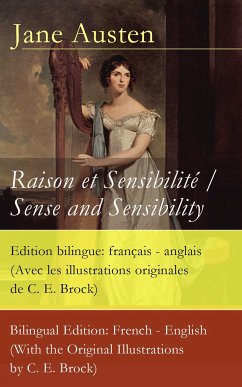
SENSE & SENSIBILITY (Illustrated Edition) (eBook, ePUB)

PAYBACK Punkte
0 °P sammeln!
In Jane Austen's "Sense & Sensibility," readers are invited into a world of elegance and social nuance, where the conflicting ideals of reason and emotion shape the lives and loves of the Dashwood sisters, Elinor and Marianne. This illustrated edition enhances Austen's keen observations with vivid imagery, providing a deeper visual context for her sharp wit and intricate characterizations. Set against the backdrop of early 19th-century England, the novel delves into themes of morality, love, and economic stability, showcasing Austen's masterful ability to blend romantic plots with social criti...
In Jane Austen's "Sense & Sensibility," readers are invited into a world of elegance and social nuance, where the conflicting ideals of reason and emotion shape the lives and loves of the Dashwood sisters, Elinor and Marianne. This illustrated edition enhances Austen's keen observations with vivid imagery, providing a deeper visual context for her sharp wit and intricate characterizations. Set against the backdrop of early 19th-century England, the novel delves into themes of morality, love, and economic stability, showcasing Austen's masterful ability to blend romantic plots with social critique, all rendered in her trademark irony and intricate dialogue. Jane Austen, born in 1775, drew upon her own familial experiences and societal constraints faced by women of her time, crafting narratives that resonate with universal truths about human relationships. Her keen insights into the precariousness of women's fortunes-itself a reflection of her understanding of gender dynamics-are encapsulated in "Sense & Sensibility," a novel that juxtaposes the rational against the emotional, the societal against the personal. With a life spent in the genteel but limited world of rural England, Austen's perspective informs every layer of her writing. This illustrated edition of "Sense & Sensibility" is a must-read for both newcomers and long-time Austen aficionados alike. It not only showcases her timeless themes and delightful character interactions but also serves as a visual delight, enhancing the reader's experience. Rich in insights about society and human nature, this book remains a cornerstone of English literature, inviting analysis and reflection on the balance of sense and sensibility in our own lives.
Dieser Download kann aus rechtlichen Gründen nur mit Rechnungsadresse in A, B, BG, CY, CZ, D, DK, EW, E, FIN, F, GR, H, IRL, I, LT, L, LR, M, NL, PL, P, R, S, SLO, SK ausgeliefert werden.














